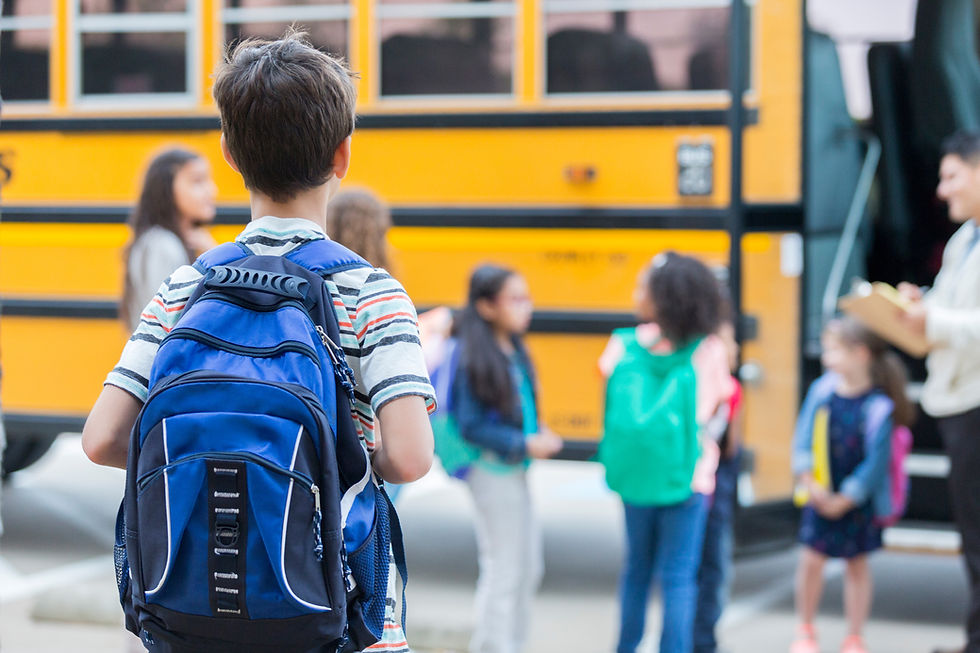SAY GOODBYE TO BACK-TO-SCHOOL BLUES
- Information VOICE_TRIBUNE
- Aug 1, 2024
- 3 min read
By UofL Health • Sponsored

When it’s time for kids to return to school, it’s normal for many different emotions to stir up in both parents and children. Some may feel excited, while others are feeling anxious, or even maybe a combination of both. However, there are ways to ease the anxieties of sending your kids back to school that can help make the transition fun and easy for the whole family.
Good Quality Sleep
Ensuring that your child gets good quality sleep can help make the process of going back to school much easier for them, both physically and mentally. Studies indicate that school-age children need anywhere between 8-12 hours of sleep per night to feel completely rested. When children are well rested, their bodies and minds can work to their full potential. Lack of sleep can also contribute to more anxiety and emotional dysregulation when making the transition of going back to school. Some of the best ways to prepare for your child to get a good night sleep include:
• Re-setting bedtimes: it’s summer vacation, so your child has probably been staying up a little later than they typically would during the school year. By re-setting their bedtime a few days before their first day of school, you can help their mind adjust back to their school bedtime ahead of the big first day. An example of this could be getting your child to go to bed earlier in 15-minute increments every night.
• Relaxing activities before bed: If your child has had time to relax before bed, they will be able to fall asleep quicker and easier, which in turn will also help you get more sleep. Some relaxing activities for them to try before bed may include reading, taking a bath, or doing some other kind of self-care practice. It’s best for your child to avoid any sort of screen time such as television or phones at least 30-60 minutes before bedtime.
• Sleep environment: it’s important to remember that the environment your child is sleeping in makes a huge impact on their quality of sleep. For best results, keep the house quiet and a comfortable temperature.
Promote Positive Mental-Health Practices
Many anxious feelings arise from the unfamiliar things that the new school year brings, whether that be new friends, a new schedule or possibly a new school altogether. By eliminating some of this uncertainty, you can help your child reduce their stress levels and adjust better. A few ways to calm these back-to-school anxieties include:
• Schedule a playdate or arrange for a friend hangout: No matter what age your child is, having strong friendships or connections can make or break how they feel about school. Talking to them about setting up a play date or a hangout with friends could be a great way for them to relax, enjoy themselves and possibly have a few more familiar faces to see around school.
• Go over their school schedule with them: Class schedules can be intimidating, and they only get more overwhelming the older your child gets. By going over their schedules with them, you will also be helping them familiarize themselves with their classes, which leads to less stress and confusion.
• Helping with homework: Homework can be one of the most dreadful experiences when it comes to school and is a huge cause of anxiety for many children. Offering them a helping hand with their homework can be a great way to lift that extra burden from their shoulders.
• Healthy meals: Our diet has a huge impact on our mental health and emotional regulation. Try incorporating some “brain healthy” foods into your child’s lunch or dinners to give them that extra mood-boost they may need to get through the week. A diet containing fruits, vegetables, chicken and nuts is a great way to start.
• Listen to their concerns: Sometimes all your child needs is a listening ear. By sitting down with them to talk for even a few minutes each day, you are giving them an outlet to express their concerns and emotions too. Try to validate their feelings and let them know that whatever they feel is okay.
If your child is suffering from school-related anxiety that has become difficult for them to manage by themselves, it may be time to consult professional help. UofL Health – Peace Hospital has different programs to help children and adolescents. To learn more, call 502-451-3330.






Comments